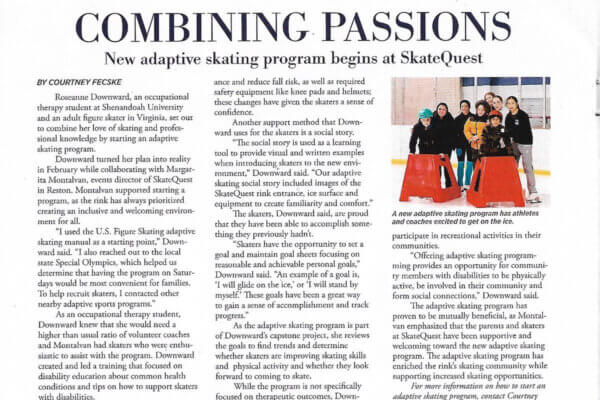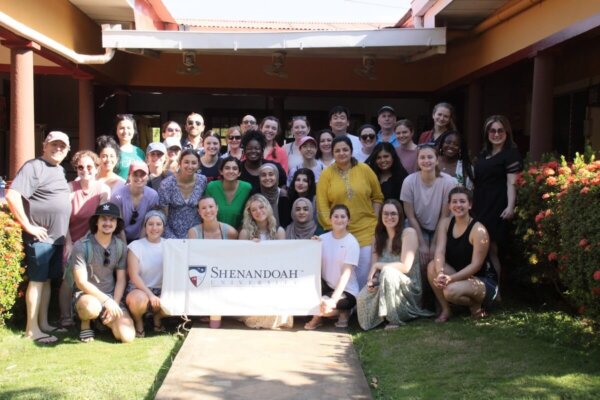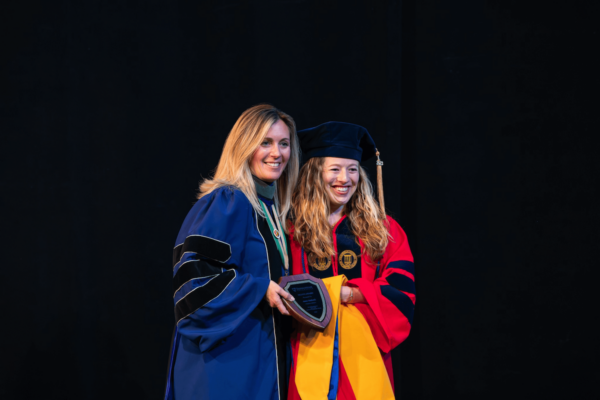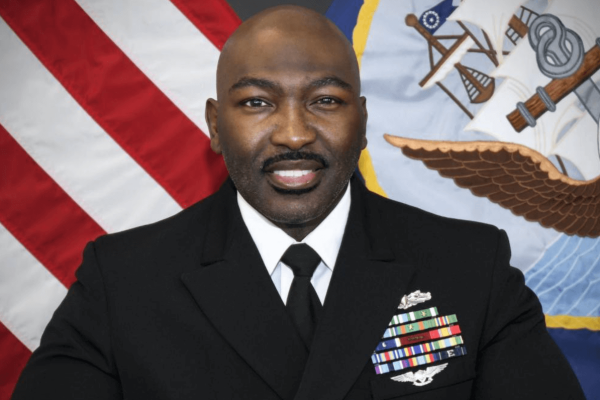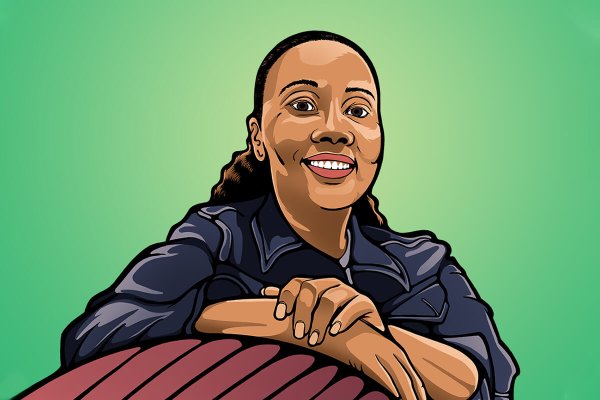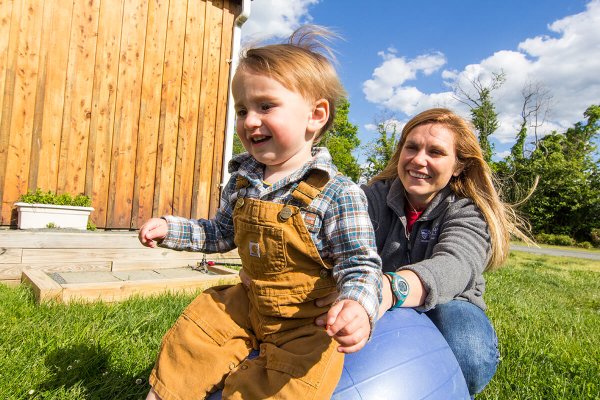Occupational therapists work with people of all ages who need specialized assistance to lead independent, productive, and satisfying lives due to physical, developmental, social, or emotional challenges.
Occupational therapy is a form of therapy for those recuperating from physical or mental illness that encourages rehabilitation through the performance of activities required in daily life.
Shenandoah University’s 75-credit, 2.5 year Master of Science in Occupational Therapy program is delivered in a flexible, hybrid format, with over 50% of the content delivered online. Students attend classes on campus one day per week at the Loudoun location in Leesburg, Virginia while fieldwork experiences are completed on non-campus days and during normal working hours.
Students can also apply for the two-year weekend Master of Science in Occupational Therapy program that meets face-to-face for classes 7 weekends over the course of the semester (approximately 2 weekends per month) at the Health Professions Building in Winchester, Virginia. Additionally, students are expected to engage in hands-on experiences in their home communities as directed by faculty. This unique learning model requires students to think critically and act professionally in independent, interpersonal and community-based problem-solving experiences.
Graduates enter the field as skilled and compassionate occupational therapists, serving a diverse range of patient populations in a variety of health care and community-based settings.
The faculty are so supportive and the flexibility of the hybrid program works well for students like me who are working. The hands-on days are great for learning, collaborating, networking, and application of the material we learn throughout the week.
Joanna Rivera ’24 | Master of Science in Occupational Therapy
Shenandoah University’s graduate program in occupational therapy prepares you to help clients reach their greatest level of quality of life and independence by serving as a caring and effective occupational therapist. Close mentorship with faculty, combined with the program’s small class sizes and practical learning experiences, prepare you to enter the field as a professional dedicated to service, ethics, and leadership.
View our program results from the National Board for Certification in Occupational Therapy (NBCOT).
“Shenandoah University’s unique hybrid program was a great fit for an individual like me who was managing multiple occupations. It was well structured with a designated day for in-person classes and weekly deadlines for assignments. This allowed me to work at my own pace, on my own time, yet stay on schedule! My advice for future students would be to maximize the opportunities you have to work with community members and patients! These opportunities helped me remember different diagnoses and interventions.” Hanifah Mohamad, MSOT, OTR/L ’21
“My favorite part about Shenandoah’s MSOT program is the level of independence it provides. It allowed me to work at my own pace, while breaking down the coursework and avoid being overly stressed throughout the week. Only meeting once a week, I was worried about the coursework and having questions, but the professors were always available throughout the week when I needed more clarification on a specific class or topic.” Noah Barb, MSOT ’22
Occupational Therapy at Shenandoah University
Welcome to Shenandoah University’s Division of Occupational Therapy. We offer three distinct entry-level programs in unique hybrid and online curriculum models to meet the needs of diverse learners. Our students graduate prepared to be a leader in the field of occupational therapy and make a difference locally, nationally, and abroad. Shenandoah University’s Occupational Therapy programs offer students the opportunity to learn all the skills they will need as entry-level occupational therapists. These skills include evaluation of clients, treatment planning, and evidence-based practice. Students will gain valuable understanding of specific treatment interventions such as adaptations to the client’s environment, splinting and mobility skills.
“The Shenandoah MSOT hybrid program offers students the ability to reach their educational goals while maintaining jobs, family life, and occupations that give our lives meaning. The faculty and staff give students the tools to grow and blossom into the amazing OTs we are all capable of being. The passion of healing holistically radiates from each individual that is affiliated with this program! I have felt so incredibly supported throughout my time in this program and I know I will always have my cohort and faculty cheering me on as we continue on our paths to heal the world!” Danielle Kirby, MSOT Student (MSOT Class of 2023)
The majority of coursework in the Shenandoah University occupational therapy programs is based on a hybrid model with over 50% of the content delivered online. Online work includes recorded lectures, readings, and various interactive online assignments. The format is flexible, with students gaining foundational understanding via assigned reading, online lectures, virtual discussions, and projects. Students also benefit from hands-on practice that emphasizes the synthesis of occupational therapy theory, evidence, and its application to clinical practice during in-person classes. Our facilities offer lab spaces where students are able to practice in simulated pediatric and adult settings, as well as work with community partners to advance their skills. Students then enter their fieldwork experiences prepared to implement the knowledge gained during formal coursework and graduate with the confidence required to enter the dynamic and exciting field of occupational therapy. View all the Shenandoah University Occupational Therapy programs.
Certified Occupational Therapy Assistants (COTAs)
Certified Occupational Therapy Assistants (COTAs) are eligible for Shenandoah University’s MSOT programs with an associate’s degree and a minimum of 90 higher education credits. COTAs applying for the OTD program must also have a bachelor’s degree.
COTA applicants may apply for any of Shenandoah University’s Occupational Therapy programs:
- The MSOT program meets one day per week (Thursdays) at the Loudoun location in Leesburg, VA. The MSOT program is completed in 2.5 years, with the first summer off.
- The MSOT Weekend program meets 7 weekends per semester (approximately 2 weekends a month) at the Health Professions Building in Winchester, VA. The MSOT Weekend program is completed in 6 consecutive semesters (2 years).
- The OTD program meets one day per week (Tuesdays) at the Health Professions Building in Winchester, VA. The OTD program is a 3 year program.
COTA’s may waive the second Level I fieldwork rotation following successful completion of the first Level I fieldwork (MSOT program only).
COTAs who have passed the NBCOT exam are not required to complete the 40 shadowing hours (MSOT and OTD programs).
Note: In the case of nationally accredited (vs. regionally accredited) institutions with program accreditation from ACOTE, Shenandoah University Division of Occupational Therapy (SUDOT) may transfer ONLY those courses under the program accreditor’s umbrella, such as OT courses. SUDOT will not transfer in other courses, such as English, math, etc., which are not from a regionally accredited institution.
OTAs coming from nationally accredited institutions will need to show that they have their non-OT course credits to reach 90 credit hours from a regionally accredited institution.
“My experience as a COTA gave me an advantage in knowing some basic foundations of occupational therapy during the MSOT program. It was exciting to be able to practice newly learned and unique skills acquired in the classroom on real-life patients as a COTA.” Derek Thompson COTA/L ’23
“An excellent program with exceptional professors that guided, mentored, & prepared my transition from Certified Occupational Therapy Assistant to Occupational Therapist.” Jasheem McRae, COTA/L ’23
“Shenandoah’s MSOT program has helped me to build upon what I have previously learned in school and practiced in the clinic as a COTA. I feel more confident in my abilities to work as a future occupational therapist!” Maddie Varona, COTA/L ’24
Graduation Rates & Cost Of Attendance
The total number of graduates from Shenandoah University Master of Science in Occupational Therapy program at Loudoun during the 3-year period of 2021-2023 was 79, with an overall graduation rate of 93%.
Many future employers offer financial assistance while a student is in school or loan repayment options after graduation.
View our Graduation Rates, Cost Of Attendance, Scholarship Opportunities
Career and Salary Possibilities
Occupational Therapy Rankings
- The current U.S. News and World Report ranked Occupational Therapists as #20 in Best Health Care Jobs and #72 in 100 Best Jobs in 2023.
Occupational Therapy Salary Projections
The current US News and World Report indicated that occupational therapists made a median salary of $85,570 in 2021 and that the profession is expected to grow by 14% from 2021-2031.
Occupational Therapy Salary Projections
Recent reports from alumni indicate that a majority of full-time starting salaries were between $60,000-$80,000. (Sample size 10 respondents from class of 2021 working full-time)
- 20% | $40,000-$60,000
- 80% | $60,000-$80,000
Occupational Therapy Employment Projections
Recent alumni obtained entry-level positions in:
- school system
- long-term care/skilled nursing facility
- outpatient (peds and adult)
- hospital (non-mental health)
Data from 2023 indicates that all reporting recent graduates of our program who were looking for employment after graduation were employed in OT or OT-related positions within 6 months of graduating.
“The faculty and staff from the Division of Occupational Therapy are very supportive. As a pregnant mom in school, they were available and understanding. Shenandoah University’s NBCOT high pass rates tells you a lot about the program. SU hybrid program allows an individual to have a better chance for work-school-life balance” Symphony Keys MSOT, OTR/L (MSOT Class of 2021)
“I appreciated the setup of the MSOT hybrid program. As a COTA, this program allowed me the opportunity to continue to work and go to school. The atmosphere of the program created a positive and collaborative environment which I feel helped me grow into a better occupational therapy practitioner. I look back with a warm heart on the relationships and experiences I had throughout my journey in the MSOT program.” -Mollie Kamerow MSOT, OTR/L (MSOT Class of 2020)
Classes
The Master of Science in Occupational Therapy at Shenandoah University prepares future occupational therapy clinicians to use empathy, clinical reasoning, and current clinical practice skills and techniques to meet the functional needs of persons, groups and populations in diverse local and global settings. The MSOT program emphasizes cultural competence and maintains strong relationships with the surrounding community. As a hybrid program, more than half of course content is delivered online through an asynchronous learning platform.
The opportunity for hands-on learning in the community begins immediately, during the first semester of classes. Students have the opportunity to work in small groups with community partners throughout the first and second semesters. This work teaches students how to address the needs of not only individual clients, but also the needs of facilities that provide occupational therapy services.
During the second year of the program, students participate in two level-one fieldwork experiences that provide additional exposure to occupational therapy in different practice settings. These fieldworks help students to more fully understand and appreciate the depth and breadth of occupational therapy practice, and oftentimes help students to hone in on their desired future career path. In addition to fieldwork experiences, students continue didactic coursework during the second year of the program. Within these courses, students have the opportunity to refine their clinical skills and practice evaluating and treating community partner clients under the direct supervision of faculty.
The MSOT program culminates in 24 weeks of full-time level-two fieldwork experiences. During the final six months of the program, students work full-time under the supervision of a practicing occupational therapist, with the first 12 weeks spent in one clinical practice setting, and the second 12 weeks spent in a different setting.
Foundational Unit: Semester 1 (Fall)
OT 522 Foundations of Occupational Therapy
This course introduces students to the profession of occupational therapy through the discussion of its history, philosophy, values, methods and broad theories of occupational performance. Students learn to describe therapists’ roles with different populations in a variety of settings, use professional terminology and analyze occupational development across the life span. Credit(s): 4
OT 523 Therapeutic Occupation
This course covers the information and methods of using occupations as therapeutic modalities. Using a hands-on approach, students learn how to use their observation and interview skills to collect information from clients. They also learn how to apply principles and methods of activity analysis and synthesis to design customized plans intended to help clients perform occupations when they cannot be performed in the familiar way. Students apply theoretical principles and research-based methods to instruct others effectively. Credit(s): 2
OT 524 Occupation and Movement
This course addresses the basic anatomical, kinesiological and physiological structures and how they influence movement and occupational performance through the use of the cadaver lab, skills lab, and lecture. Basic concepts of biomechanics are introduced as well as how environmental/contextual factors may influence activity and motion. Throughout the course, an emphasis is placed on how human structure supports human function across environmental contexts and activity. In addition to the foundational elements of movement and how they influence occupation, students also examine how various conditions (orthopedic and medical) may impact movement and ultimately participation in a variety of occupations. Credit(s): 4
OT 525 Fundamentals of Scholarly Inquiry
This course introduces basic concepts of clinical reasoning, evidence-based practice and critical analysis. It gives students an introduction to interview and observation through the lens of qualitative research methods. The course is presented through in-class lecture and discussion, practical exercises and readings. Credit(s): 3
OT 526 Foundational Case Groups I
This small group, problem-based learning course teaches students to analyze cases that draw on content from multiple foundation unit courses. The overarching focus is to develop critical thinking skills, informatics skills and professional behavior appropriate for a small group setting. Credit(s): 1
OT 527 Community Application with Individuals
Students with the help of site facilitators and faculty members will help an individual explore their occupational performance. In order to accomplish this task, students will integrate content and skills gained through courses in the first semester of the SUDOT program. Each student will utilize appropriate skills such as observation, interviewing, biomechanical evaluation (active range of motion and strength) and activity analysis. Additionally, students will demonstrate an understanding of the role of occupational therapy by designing client-centered, occupation-based activities. Credit(s): 2
Foundational Unit: Semester 2 (Spring)
OT 531 Scholarly Inquiry: Quantitative Design and Analysis
This course focuses on the development of skills to validate practice, evaluate evidence and inform clinical decisions. This course introduces designs in the experimental (or quantitative) tradition and statistical analysis that are typical in OT research. Students are introduced to statistical software. Credit(s): 3
OT 532 Neuro-Occupation
Neuro-occupation emphasizes the dynamic interactions between the central nervous system and occupation. Upon completion of this course, students have an understanding of the neuro-anatomical, neuro-chemical and neuro-physiological concepts that influence daily performance areas. Through clinical cases, review of research, lecture, and clinical application sessions, students learn about neurological conditions and the interplay between neurological functions, occupational performance and meaningfulness. Credit(s): 5
OT 534 Analysis of Health and Occupation
This course is based on the philosophy and research about the relationship between occupations and health. Students discuss theories and models that link occupation to individual, public health, and health changes.. The impact of various conditions on occupational performance is discussed. Credit(s): 2
OT 535 Management and Systems in Occupational Therapy Settings
This course is designed to introduce, examine, and develop skills necessary for health care management and administration. An emphasis is placed on concepts of systems management and leadership as they relate to the management of services. In addition, the role of the occupational therapy supervisor/manager this course emphasizes leadership, communication, budgeting, program development and evaluation, staffing, reimbursement, quality care, policy and procedure development, cost containment, current trends in health care, productivity, entrepreneurship and professional ethics. Credit(s): 3
OT 536 Foundational Case Groups II
This small group, problem-based learning course teaches students to analyze cases drawing on content from multiple foundation unit courses. The overarching focus is to develop clinical reasoning skills which include an understanding of the links between occupational performance, disease/disability, health/wellness, and the systems in which individuals function. Credit(s): 1
OT 537 Community Application in Systems
Community application sessions integrate semester content and skills through on-site sessions in community agencies. Students and faculty evaluate systems and community-based programs that meet the diverse needs of individuals with various medical conditions. A major focus of learning and programs is the governmental, community and agency systems that impact service to individuals and groups. This course integrates content through reports and projects for the agencies that are considered capstone projects. Credit(s): 2
Basic Unit: Semester 3 (Fall)
OT 621 Scholarly Inquiry: Development and Evaluation of Therapeutic Programs
The course emphasizes program development and program evaluation in OT. Students work with a faculty mentor to establish the components of a specialized occupational therapy program with an evaluation component for a specified client population. Content is presented through in-class lecture and discussion and practical exercises in order to develop the student’s clinical reasoning, ability to critique scholarly literature and understand scientific methods. Credit(s): 2
OT 623 Occupational Therapy in Biomechanical and Neurological Practice
This is a practice-oriented course designed to develop competencies in occupational therapy evaluation and intervention with an emphasis on adult clients with a variety of neurological, general medical and orthopedic disorders. Students explore the intervention process while utilizing a variety of models of practice. Students select and administer standardized and non-standardized assessment tools and use information for the purpose of treatment planning and determining the effectiveness of intervention strategies adopted. Students become familiar with the application of various models of practice and explore a variety of intervention strategies and activities for both the remediation of and adaptation to occupational performance deficits. In addition, the course incorporates documentation, family and caregiver support and education, environmental modifications, discharge planning and working as a member of a multidisciplinary team. Credit(s): 4
OT 624 Occupational Therapy in Mental Health Practice
This is a practice-oriented course designed to develop student competence with implementation of the occupational therapy process for clients with a variety of mental health conditions across the lifespan. Applications to assessment and treatment within various psychiatric treatment settings are emphasized while utilizing both occupation and non-occupation-based frameworks to guide clinical reasoning, including Person-Environment-Occupation (PEO) and Recovery models. Individual and group programming modalities will be understood in the context of the lived experience of individuals with mental illness and their families to prepare students for delivery of effective client and family-centered care in traditional and non-traditional behavioral health environments. Credit(s): 3
OT 625 Occupational Performance and Participation: Children
This practice-oriented course provides students with an overview of occupational therapy in the area of pediatrics. Emphasis is placed on the child and family in the context of environment and cultures as well as the effect of disability on occupational performance. Evaluation, intervention planning and intervention techniques from a variety of theoretical perspectives are explored. Credit(s): 4
OT 626 Basic Case Groups
This small group, problem-based learning course teaches students to analyze cases drawing on content from multiple basic unit courses. The overarching focus is to further develop clinical reasoning skills by applying evidence-based evaluation, intervention and documentation skills to complex cases. Credit(s): 1
OT 628 Basic Level One Fieldwork
This is the first in a series of four fieldwork experiences where students are assigned to a qualified professional for a minimum of 48 hours in a traditional or emerging practice setting. The student will develop comfort level with, and understanding of, the needs of clients, and practice foundational skills taught in the previous two semesters. Students will demonstrate professional behaviors, implement personally designed learning objectives and tasks, and actively participate in service provision with clients commensurate with their learning to date. Credit(s): 1
Bridge Unit: Semester 4 (Spring)
OT 630 Scholarly Inquiry: Application
This is the program capstone course designed to give students the opportunity to gather evidence for occupational therapy methods. Content is presented through in-class lecture, discussion and practical exercises. The course focuses on the development of projects related to evidence-based practice. Credit(s): 3
OT 631 Specialization: Occupational Therapy with Children
This is an advanced pediatric course about occupational therapy practice in specific practice areas. Advanced theories, evaluation, and intervention methods are covered. Students critique research and evidence for occupational therapy effectiveness in pediatrics. To integrate theory, evaluation, planning and implementation, students work with a child and family in the community as their final project. Credit(s): 3
OT 635 Specialization: Occupational Therapy for Adults
This course emphasizes evidence based, in-depth strategies for occupational therapy assessment and treatment in special topic areas. Content includes, but is not limited to, the theory and application of physical agent modalities, advanced splinting techniques, the role of OT with individuals with low vision, and emerging practice areas such as tele-rehabilitation, adult well-elderly and community based services. Additionally, content emphasizes occupational therapy practice with the aging population. Credit(s): 3
OT 633 Environmental Interventions
This course instructs students in the assessment and application of environmental interventions. Students learn about theories, funding and legislation, documentation and research evidence. Students learn how to collaborate with clients to select and modify environmental interventions, advocate for funding and policies supporting environmental interventions and educate clients on their use to improve their occupational performance. Credit(s): 3
OT 634 Policy and Advocacy
This course gives students the skills necessary to analyze federal, state, and organizational policies. Major policies that impact occupational therapy and other health professions are analyzed. Advocacy, both on behalf of clients and the profession, is explored. The course is presented in the context of the major systems with which occupational therapists interact. Credit(s): 3
OT 638 Bridge Level One Fieldwork
This is the second in a series of fieldwork experiences where students are assigned to a qualified professional for a minimum of 48 hours in a traditional or emerging practice setting. This course involves practicing basic therapeutic skills learned in the previous semester. Students will build on their previous fieldwork by designing more complex personal learning objectives and tasks, and being more actively involved in service provision with clients commensurate with their learning to date. Credit(s): 1
Applied Units: Semesters 5 & 6 (Continues right after Semester 4 – Summer & Fall)
OT 640 Level Two Fieldwork
The purpose of Level II fieldwork is to provide occupational therapy students with the opportunity to apply the academic knowledge and skills learned in the classroom to selected clinical settings under the supervision of a practicing clinician. Placements are selected to expose students to a variety of client ages and diagnoses and clinical settings, and provide experiences that promote clinical reasoning, professionalism and reflective, ethical practice. The goal of these placements is to produce competent, entry-level, generalist therapists. The American Occupational Therapy Association requires that Level II fieldwork be the equivalent of 24 full-time weeks and each of these courses involves 12 weeks of full-time supervised clinical practice. After completion of both fieldwork courses, students return to campus for sessions to prepare them for the registration exam and facilitate their transition to professional life. These two fieldwork courses may be taken in any order. Credit(s): 6 each course.
OT 640: Level II Fieldwork (6 credits) Begins after Semester Four of the OT Program. Typically begins the middle of May and ends August (12 week rotation)
OT 641 Level Two Fieldwork
The purpose of Level II fieldwork is to provide occupational therapy students with the opportunity to apply the academic knowledge and skills learned in the classroom to selected clinical settings under the supervision of a practicing clinician. Placements are selected to expose students to a variety of client ages and diagnoses and clinical settings, and provide experiences that promote clinical reasoning, professionalism and reflective, ethical practice. The goal of these placements is to produce competent, entry-level, generalist therapists. The American Occupational Therapy Association requires that Level II fieldwork be the equivalent of 24 full-time weeks and each of these courses involves 12 weeks of full-time supervised clinical practice. After completion of both fieldwork courses, students return to campus for sessions to prepare them for the registration exam and facilitate their transition to professional life. These two fieldwork courses may be taken in any order. Credit(s): 6 each course.
OT 641: Level II Fieldwork (6 credits) Typically begins August or September (depending on the second rotation) and is also 12 weeks.
*All Fieldwork Experiences Are Completed On Non-campus Days And During Normal Business Hours.
Fieldwork Education
The MSOT program has two Level I fieldwork experiences. After the didactic learning on campus is completed, students will complete two 12-week Level II fieldworks to attain the level of competence of an entry-level therapist. The four fieldwork rotations will be completed in a combination of pediatric and adult settings. At least one fieldwork experience must have a focus on mental health/psychosocial.
National Certification Examination For the Occupational Therapist (NBCOT)
Graduates of the program will be eligible to sit for the National Certification Examination for the Occupational Therapist administered by the NBCOT. After successful completion of this exam, the individual will be a registered occupational therapist. Most states require licensure to practice; however, state licenses are usually based on the results of the NBCOT certification examination. A felony conviction may affect a graduate’s ability to sit for the NBCOT certification examination or attain state licensure. In addition, fieldwork placements may be limited or unattainable in out-of-state locations due to varying state restrictions.
Application Information
Shenandoah University’s Division of Occupational Therapy requires all applicants to go through OTCAS for the application process. This is an online centralized application service located at www.otcas.liaisoncas.com which has a thorough and accurate list of all required documents and prerequisites for the program. You can also find prerequisite information on the Program Admission Prerequisites tab below.
Application Process Timeline for 2024 Start Term
| OTCAS Opens | July 21, 2023 |
| Priority Deadline | November 15, 2023 |
| Rolling Deadline | Up to June 1, 2024 -based on space availability |
| Interviews | Held monthly September 2023 through June 2024 |
| OTCAS Closes | June 1, 2024 |
| Classes Start | August 2024 |
Shenandoah occupational therapy alumna Brenna Mauro shares her thoughts on what incoming OT students should know about OT school. Shenandoah University lets you benefit from her experience as she offers great advice about being successful by staying organized, being kind to yourself, and embracing the entire process of OT education.
Program Admission Prerequisites
ADMISSIONS REQUIREMENTS
-
Bachelor’s degree or higher from a regionally accredited institution prior to matriculation. COTA applicants with an associate’s degree must have completed 90 credit hours (can include all OTA courses) prior to matriculation.
-
A grade of “C” or above is required for all prerequisite courses. AP credits are not acceptable for prerequisite coursework.
-
Three letters of recommendation are required to be submitted through OTCAS: One must be from a licensed occupational therapist. Of the remaining two, one must be from a current/recent professional contact or current/recent academic contact. No personal references are accepted.
-
Demonstrate knowledge of the profession by completing a minimum of 40 shadowing hours under a licensed occupational therapist at the time of application. Exposure to multiple practice settings is encouraged. COTAs that have passed the NBCOT exam are not required to complete shadowing hours.
-
Personal Essay: Your essay should address why you selected occupational therapy as a career and how this degree relates to your immediate and long-term professional goals. Describe how your personal, educational, and professional background help you achieve your goals. This essay is an important part of your application and allows you to clearly and effectively express yourself. Do not personalize this essay for a particular program, as it is shared with all of your programs that you apply for through OTCAS.
-
No GRE required
PREREQUISITES
Prerequisite courses taken during the COVID-19 outbreak (Spring 2020-Summer 2022) with a virtual lab and/or P/NC or P/F grade of “P” will be accepted for credit. In situations where candidates were awarded P/F grades, the grade point average (GPA) for those grades is not impacted in the calculation of GPA. SUOT will only consider the GPAs calculated by OTCAS.
The GPA requirements for program admission will not change.
Applicants must still have the following academic requirements to be admitted:
-
A Minimum 3.0 overall grade point average (GPA)
-
A Minimum 3.0 prerequisite grade point average (GPA) with 3.2 preferred
All students must have completed the following courses with grades of “C” or better:
- 3 credits: General or Introductory Psychology
- 3 credits: Abnormal Psychology
- 3 credits: Statistics Course (content must include descriptive and inferential statistics)
- 6 credits (minimum): Two sequential courses in Human Anatomy & Physiology. Content must include lecture and laboratory sections to include human structure and function, including the musculoskeletal system and an overview of the nervous system. For all courses taken after Summer 2022, labs must be completed in person; no online labs will be accepted).
- 6 credits Social Science (two 3-credit hour courses) can include courses in: sociology, anthropology, ethics, economics, political science, community or public health, epidemiology, gerontology, religion, philosophy, gender studies, or cultural or urban studies.
- 3 credits (minimum): Life Span Human Development from infancy to the elderly (Course content covering infancy to the elderly and including physical development; students may have to take more than one course to meet this requirement)
- 1 credit: Medical Terminology course (CEU courses/certificates are not accepted)
- No more than 9 outstanding credits of prerequisite course work permitted at time of application
- Outstanding credits must be shown in OTCAS as courses “in progress” or “planned” and must be completed prior to matriculation.
- No AP Credit or CLEP credits are accepted for prerequisites.
- Students must also complete all required application materials as listed on OTCAS to be considered for application.
Essential Functions And Professional Behaviors
Computer Technology Requirements
Important Information for COTA Applicants:
Health Requirements
International Opportunities
Shenandoah University and the OT programs pride ourselves on our international opportunities for experiential learning. We regularly engage in interprofessional and intraprofessional abroad trips to places such as Haiti, Ecuador, and Morocco for course credit. We are always open to new opportunities for expanding our collaborations abroad.
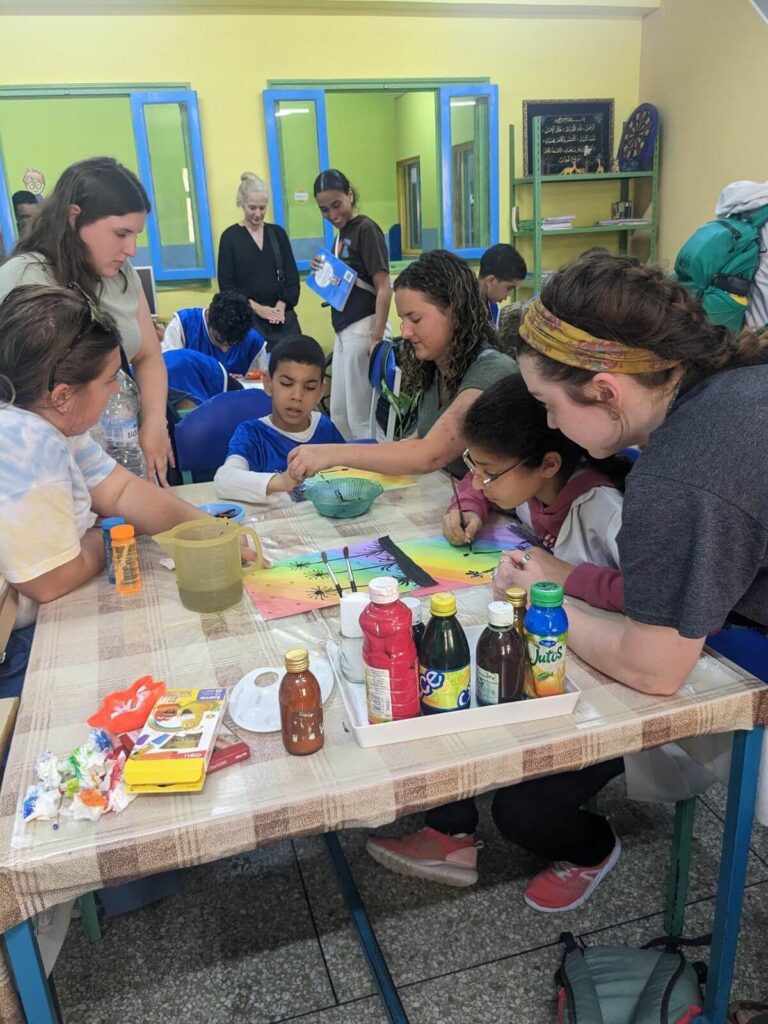
Related Programs
Entry Level Doctor of Occupational Therapy (OTD) – Winchester
This program is for individuals who have a bachelor’s degree and are interested in obtaining an OTD.
Post Professional Doctor of Occupational Therapy (OTD) – Online
This program is for occupational therapists who have a master’s degree and are interested in obtaining an OTD.
Entry Level Master of Science in Occupational Therapy (MSOT) – Weekend Program – Winchester
This program is for individuals who have a bachelor’s degree or an OTA associate’s degree and are interested in obtaining a master’s degree in occupational therapy.
COTA Associates to Master of Science in Occupational Therapy (MSOT) –Loudoun and Winchester
This program is for Occupational Therapy Assistants who have an associate’s degree or higher and are interested in becoming an occupational therapist.
Early Assurance Entry Level Doctor of Occupational Therapy (OTD) or Master of Science in Occupational Therapy (MSOT) – Loudoun and Winchester
This program is for high school students who are interested in becoming an occupational therapist by attending Shenandoah University as an undergraduate student for 3 years and then transitioning to the Entry Level OTD, or attending as an undergraduate student for 2.5 years then transitioning to the Entry Level MSOT Program.
Shenandoah University Articulation Agreement
This articulation agreement provides a simplified, guaranteed admissions process for a limited number of undergraduate students from Shenandoah University.
NOVA Community College Articulation Agreement
This articulation agreement provides a simplified, guaranteed admissions process for a limited number of undergraduate students from Northern Virginia Community College (NOVA).
Contact Us
MSOT Program – Loudoun
MSOTAdmissions@su.edu
540-542-6551
Accreditation
North Bethesda, MD 20852-4929
301-652-AOTA
www.acoteonline.org
Gaithersburg, MD 20878
Phone (301)990-7979 Fax (301)869-8492
https://www.nbcot.org/
Students in the master’s level program upon graduation from Shenandoah University’s Division of Occupational Therapy (SUDOT), will receive a Master of Science in Occupational Therapy. The MSOT program is accredited by the Accreditation Council for Occupational Therapy Education (ACOTE®) of the American Occupational Therapy Association (AOTA). The MSOT Loudoun program’s next full accreditation review is in 2025/2026.
